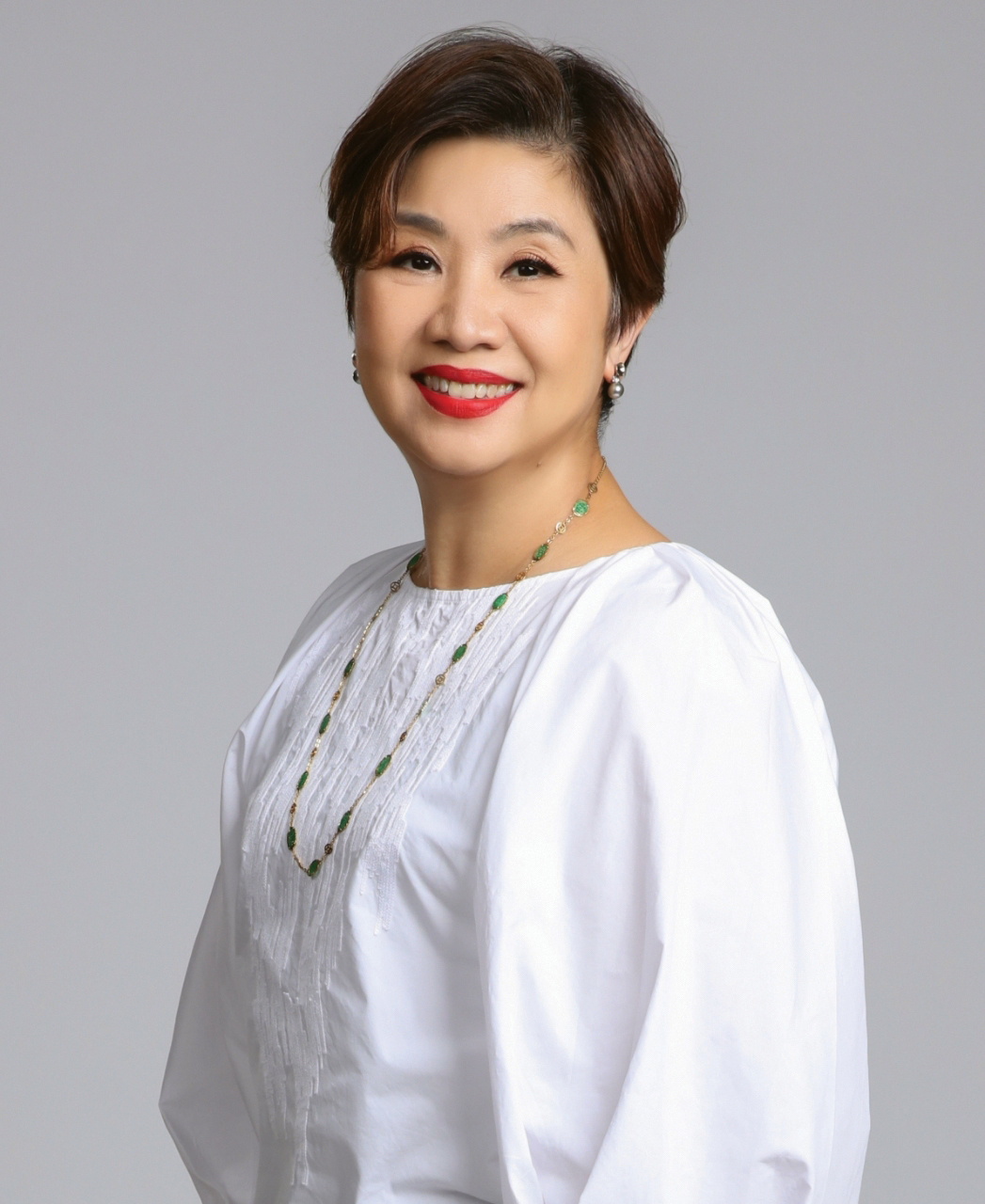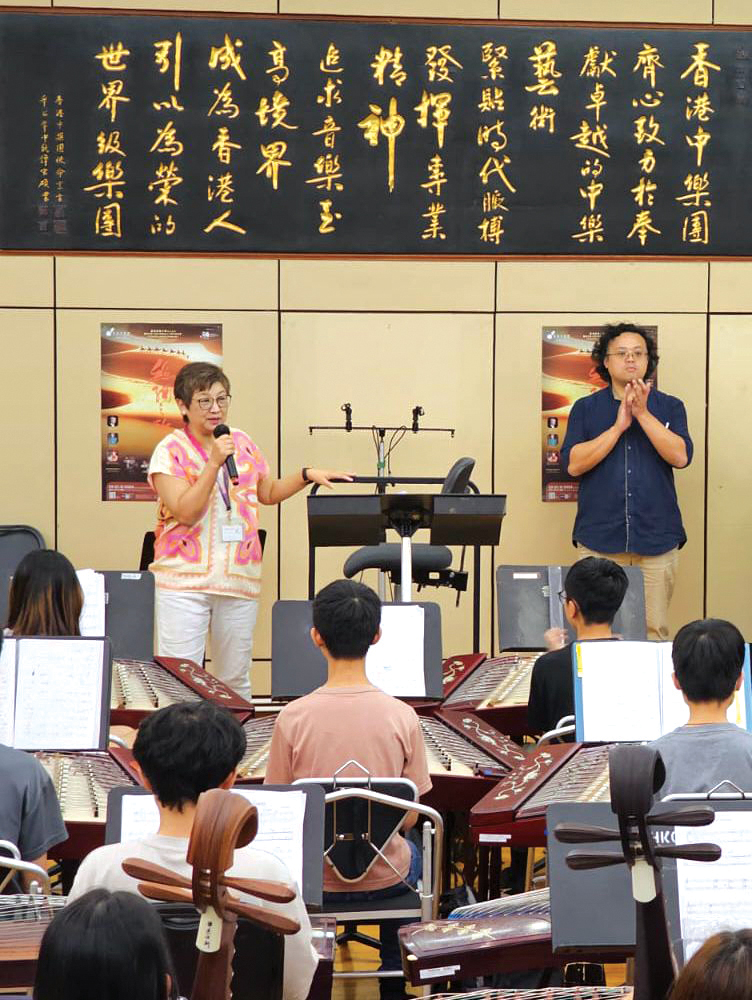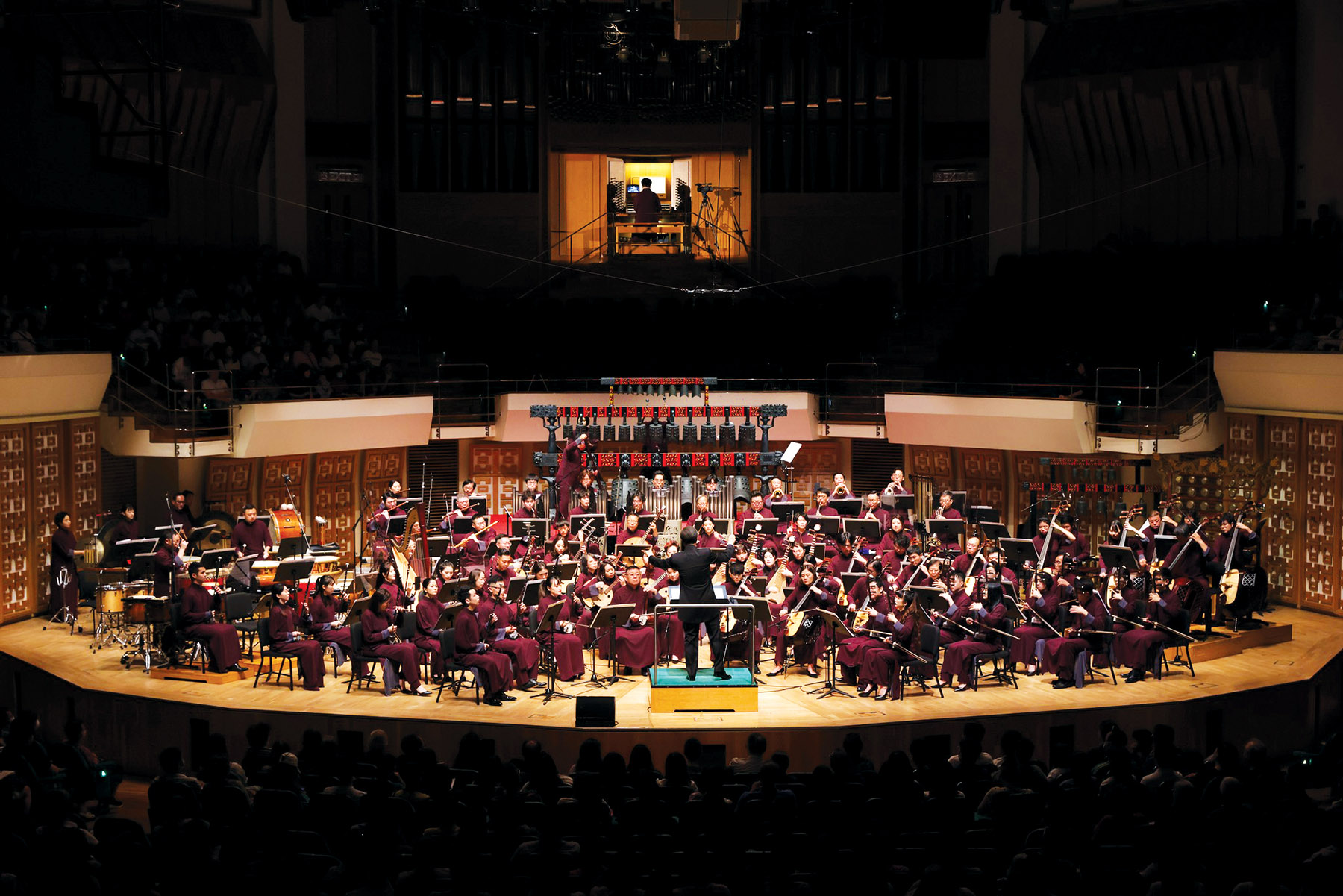The Hong Kong Chinese Orchestra prides itself on being an indispensable force in cementing Chinese culture and music internationally. Executive Director Celina Chin Man-wah says more needs to be done to solidify the city’s status as a vibrant East-meets-West cultural exchange hub. Fang Xue reports from Hong Kong.

Driving Chinese culture and helping it to take its rightful place alongside Western art had been very much a part of Hong Kong life in the past.
That is the cherished mission of the Hong Kong Chinese Orchestra, which marks its 47th anniversary this year, championing its goal of lifting ethnic Chinese music and culture on the global stage. “It’s a fitting tribute to Hong Kong’s position as an East-meets-West center for international cultural exchange,” says the orchestra’s executive director, Celina Chin Man-wah.
Chinese cultural events are gathering steam in Hong Kong, making their mark and becoming increasing popular among parents and children during holiday celebrations and activities, she tells China Daily.
“Western forms of art had often been the norm for festive occasions in the past in this city. But we are now seeing more and more events that allow us to experience Chinese culture,” says the arts veteran with more than two decades’ experience. This has helped to nurture Hong Kong residents’ cultural identity and confidence, she adds.
READ MORE: On a high note
The HKCO, founded in 1977 as a government entity before becoming a nonprofit organization, held a concert this year, using the bianzhong — an ancient instrument known as chime bells — to play signature Chinese music works commemorating the 75th anniversary of the founding of the People’s Republic of China.
The National Day performance, organized in collaboration with the Leisure and Cultural Services Department, drew acclaim from the audience. A duet, featuring the symphony of bianzhong, the “king of Chinese instruments”, and the organ, the Western “king of instruments”, stole the show.
The Hong Kong Special Administrative Region’s status in the arts arena has been entrenched in the nation’s 14th Five-Year Plan (2021-25), catalyzing the city’s arts development, especially in the post-pandemic era.
According to the annual arts survey reports of the Hong Kong Arts Development Council, the SAR organized 10,946 physical arts and cultural programs in the 2018-19 financial year. In 2021-22, it hosted 7,963 physical and 2,005 online cultural events despite the COVID-19 pandemic.
Chief Executive John Lee Ka-chiu said Hong Kong will continue to host mega events to promote itself as a must-visit world city, with several featuring Chinese culture. From June to September, the city held its first Chinese Culture Festival with a myriad of activities — the Chinese Opera Festival, music, dance, film shows, exhibitions, meet-the-artist sessions and master classes. From Saturday through Nov 24, Hong Kong, for the first time, will host the Guangdong-Hong Kong-Macao Greater Bay Area Culture and Arts Festival, jointly presenting over 260 performances, exhibitions and exchange activities with other cities in the Greater Bay Area. They will include a wealth of signature arts and cultural events showcasing the region’s characteristics and Lingnan culture.
Chin is pleased to note that the number of arts shows hosted by the business sector, independent arts groups or solo artists are rising. But she says Hong Kong needs to do more — and says the city needs 20 percent more arts administrators for performances and artistic activities.
Arts administrators are of vital importance to Hong Kong’s ability to host arts events as a large number of these professionals are needed to help the city put on a wealth of activities, whether locally produced or with invited performers from abroad, says Chin who also helms the Hong Kong Arts Administrators Association.
Arts administrators manage the business and operational aspects of arts organizations, handling tasks like budgeting, fundraising, marketing and planning events to support artists and cultural institutions, and ensuring that creative projects reach their intended audience. Notable arts administrators include event coordinators, marketing managers and organizers of cultural activities. According to Chin, the association, which helps to advertise job vacancies for arts groups on its webpage, handles more than 800 job offers annually.
The HKCO is also facing a serious personnel shortage with over 100 concerts due to be held each year although its administrative team has been expanded from 20 to 30. The orchestra’s marketing department originally had six people, but three of them have left, along with two marketing managers, crippling the team’s ability to host events.

Cultivating talent
The solution is to have more diverse funding support programs from the government, and attract professionals by promoting arts administration jobs in universities and secondary schools. To cultivate talent and increase the demand for related events, the SAR government set aside an additional HK$216 million ($27.8 billion) from the 2018-19 to the 2023-24 financial years to help young people become arts administrators. The LCSD and the HKADC — two major providers of training for arts administrators — expect the funding to create 740 training opportunities.
According to the HKADC, it has so far offered 137 internships for junior arts administrators, while 27 people received arts administrator scholarships for further studies in arts related subjects at home and abroad from 2018 to 2022.
Last year, it started its arts talent internship matching program which offers internships for arts administrators and artistic and production personnel and matches jobs in arts groups with recent graduates. During the 18-month internship, the council will cover interns’ salaries, the minimum of which has risen from HK$16,400 in 2023 to HK$17,200 this year. Interns are required to participate in at least three public projects under the program.
According to the council, all internship places for 2024-25, with 30 positions for arts administrators and 55 openings for artistic and production personnel, have been filled due to the “overwhelming response”.
The LCSD also provides a trainee program for arts administrators. The two-year program offers training on skill sets, such as venue operations, events promotion and organization of performing arts programs, carnivals, and cultural exchange activities. Trainees can acquire hands-on experience with the department’s venue partners and the Hong Kong Arts Festival Society in managing arts related events.
Chin says direct government funding is one of the most effective ways to address the pressing shortage of arts administrators. The arts administrators’ association has launched a charm offensive among young people, hoping to lure people early by hosting career talks and fairs at universities and secondary schools.
Many people, she says, have the wrong impression that arts administrators need to take arts related courses. “We hope to clarify that misunderstanding through campus promotions.”
Attracting new audience
Apart from cultivating talent to meet the growing demand for cultural events, Chin says the hearts and minds of the audience need to be restored as their attitudes have changed following the pandemic — some have lost the habit of going to theaters and this has to be revived. Although she believes loyal audiences will eventually return to the theaters, it’s important for arts administrators to cultivate new audiences by launching long-term audience development programs, such as educational projects and parent-child activities, to arouse young people’s interest in the arts.
The HKCO is offering various courses for guqin enthusiasts, as well as children and adults with no prior knowledge of the traditional, time-honored seven-string Chinese musical instrument. The courses range from basic finger techniques and skills to understanding jianzipu notation — a simplified tablature indicating string, finger position, and plucking techniques for songs of guqin, allowing many parents and their children to appreciate the prowess of the ancient instrument.
Chin notes that audiences from Chinese mainland cities in the Greater Bay Area have grown rapidly, showing strong interest in Hong Kong’s cultural activities and performances. In her view, Hong Kong arts administrators should strengthen communication with arts related administrative departments in the Greater Bay Area, expanding the promotion and publicity of Hong Kong’s arts performances to new audience groups.
Her association hopes to rely on the growing audience interest in the region, as well as the deepening ties between mainland cities and Hong Kong by extending its membership to peers across the border. This would enable more mainland arts administrators to participate in Hong Kong’s training and exchange activities, while frequent exchanges among artists from different cultural backgrounds can spark new ideas and create artworks that are suitable for audiences in both regions and reflect artists’ unique characteristics.

Promoting Chinese music
Chin says the city has always been a center for cultural exchange between China and the world because of its geographical location and historical background.
At the helm of the HKCO — one of Hong Kong’s “cultural ambassadors” — Chin said she hopes the orchestra can jump on the bandwagon of the city’s ambitious mission to be an East-meets-West hub to promote Chinese music on the international stage.
ALSO READ: HK’s first performing arts expo to spotlight Chinese talent globally, says Fok
Amid the nation’s initiative to make Hong Kong a cultural exchange hub and the provision of relevant policy support, local art groups can now apply for more funding for global arts exchange projects to expand their influence.
Hong Kong arts administrators should seize this opportunity to boost cooperation with various countries and regions, says Chin. “We should continuously explore new art forms and cooperation models to adapt to the rapidly changing cultural environment and better leverage Hong Kong’s integration advantages in arts.”
Education background
2017
Doctorate in Professional Studies, Middlesex University
2006
Master of Arts in Strategic Management for Nonprofit Distributing Organization, Middlesex University
Career highlights
2024
Chairperson of the Hong Kong Arts Administrators Association
2007-16
Arts adviser (arts administration) to the Hong Kong Arts Development Council
2006-08
Member of the Performing Arts and Tourism Advisory Group of the Consultative Committee on the Core Arts and Cultural Facilities of the West Kowloon Cultural District
2001-now
Executive director of the Hong Kong Chinese Orchestra
1989
Joined the Cultural Services Section of Hong Kong’s former Urban Services Department, held various posts for the Hong Kong Repertory Theatre, the Festival of Asian Arts and the Hong Kong International Film Festival
Contact the writer at fangxue@chinadailyhk.com


